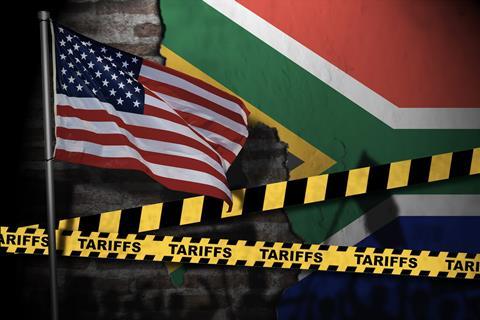As the new US trade tariff deadline looms, citrus growers in South Africa are holding their breath over what will happen during the next week

South Africa is awaiting further engagement from the US on a new trade package as the local fruit export industry enters a crucial week.
The 90-day pause in the new 30 per cent tariffs will run out next week. If restored, it will be a crucial blow for, specifically, the Cape citrus growers and exporters who are now in the middle of their season.
According to sources in the business, analysts now accept that the AGOA deal is probably dead and buried.
Under AGOA, South Africa has established a lucrative citrus export programme in the US, and in recent seasons around 100,000 tonnes of citrus was exported, sustaining a large community in the Cape’s rural regions.
The current tariff rates are expected to run out next week – and there is little time to get trade agreements in place.
Some sources said either a new deal can be concluded and announced before the deadline ends, or current arrangements could also be extended somewhat.
There is no doubt that this is a period of great uncertainty for all.
At the same time, the country’s citrus industry acknowledged that every dark cloud has a silver lining, and this saying is highly relevant now.
Dr Boitshoko Ntshabele, CEO of the South African Citrus Growers’ Association (CGA), said that while trade turmoil and geopolitical events unsettle the industry, they have also injected a much-needed dose of urgency.
“It is worth taking a glance at some of the important markets for South African citrus with this in mind,” he said.
’The Chinese government recently announced an offer to extend duty-free market access to African countries and also eliminate tariffs on 98 per cent of taxable products originating from these nations.”
He also noted that ongoing citrus promotions in India introduce more consumers to the ”exceptional taste” of South African citrus.
“It also builds on the growing friendship and trade ties between South Africa and India,” Ntshabele continued. ”The new promotional activities, which includes in-store promotions, product sampling, influencer partnerships, social media engagement, and collaborations with retailers and distributors, are linked to those undertaken by Hortgro under the banner of the ‘Beautiful country, beautiful fruit, exceptional taste’ slogan.”
Leading South African apple exporters Tru-Cape recently announced that its promotions have brought new dimensions to the sale of South African apples and pears in India.
The CGA said high tariffs in India continue to be a serious hurdle, with some respite on the phytosanitary side on the horizon.
“We are expecting visits by the ministers of Trade and Agriculture to India, with the hope that they will resolve these trade issues there,” the association stated.
”These cases show that in the current climate, opportunities exist for the expeditious resolution of some trade issues with different markets.”
The elephant in the room remains the US policy on trade, and what might come South Africa’s way over the next two weeks when the 90 day pause expires.
“There is considerable doubt about the renewal of AGOA by the Trump administration,” Ntshabele confirmed. ”AGOA is a unilateral trade agreement offered by the US administration to African countries and is up for renewal in September.
“Many analysts suggest a new preference to rather enter bilateral frameworks by the current US administration,” he explained.
”The suspension of a 30 per cent tariff on all imports from South Africa by the Trump administration will technically lapse soon, unless renewed.
”A South African delegation travelled to the US in May and tabled a proposal of a trade package and now await further engagement from the US towards trade talks.”
For South African citrus exporters this is a critical time. All citrus shipped before the 9 July deadline will technically enter the US at current tariffs rates.
South African exporters have also indicated that they can continue to export on the current 10 per cent tariff rate.
However, with the bulk of the South African mandarin and orange season still ahead, any upward adjustment will be extremely damaging.



